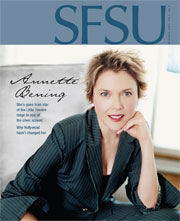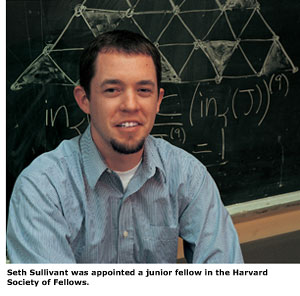 |
| |||
Adding to his Success The University of California, Berkeley, doctoral student joins an elite group. Former junior fellows have gone on to win the Nobel Prize. "I hope I can live up to all the expectations which people now have of me," says Sullivant, who was taken by surprise when he received the good news in December. Associate Professor Serkan Hosten is proud of Sullivant, his former student and the co-author of four of Hosten's scientific papers. "Being a junior fellow is extremely prestigious and is usually considered as recognition that a young scientist will become a national and world leader in his or her field," Hosten says. The Society of Fellows was organized in 1933 at Harvard to bring together mathematicians from different disciplines. During his three-year appointment, Sullivant will meet with other fellows at Harvard to talk mathematics. The first-year stipend for junior fellows is $56,000, to cover living expenses. Sullivant studies algebraic statistics, which applies algebra to the science of data analysis, and computational biology, which uses statistics to analyze DNA and other biological occurrences. His research work has been published in leading mathematical journals. The alumnus knew he had a future in math as early as the fifth grade, when his classmates were divided into small groups based on their mathematical abilities. "I ended up in a group by myself and got to pick what I wanted to study," Sullivant says. "But I wasn't spending all of my time on math. ⦠I was a well-rounded nerd. I played in the band and was captain of the quiz bowl team." Before coming to SF State as a graduate student in 2000, he was focused on teaching, not research. Sullivant says the personal attention and encouragement he received from his professors "helped to show me that research was worthwhile and that I could be good at it." He will soon earn his Ph.D. in mathematics from Berkeley, after three years in the program. Sullivant plans to move to Boston, attend math conferences, continue his research and eventually become a professor -- ideally at Harvard. As for the "math geek" stereotype, he says, "Certainly, there are a few oddballs, but there are tons of normal mathematicians out there. ⦠They have hobbies and friends and know how to have fun." And they also know how to tell a good joke. "How can you recognize an extroverted mathematician?" Sullivant asks. "When he talks to you, he looks at your shoes." | ||||










